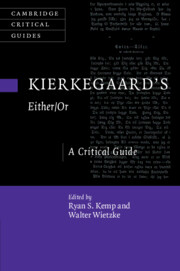Book contents
- Kierkegaard’s Either/Or
- Cambridge Critical Guides
- Kierkegaard’s Either/Or
- Copyright page
- Contents
- Contributors
- Acknowledgments
- Abbreviations
- Introduction
- Chapter 1 Existential Melancholia
- Chapter 2 Don Giovanni and the Musical-Erotic
- Chapter 3 For What May the Aesthete Hope?
- Chapter 4 Companions in Guilt
- Chapter 5 A’s Religion of Boredom
- Chapter 6 The Artist Is Not Present
- Chapter 7 Failed Temporalities in Either/Or
- Chapter 8 Love, Marriage, and Delusion in Either/Or
- Chapter 9 The Philosophy of Science in Either/Or
- Chapter 10 The Despair of Judge William
- Chapter 11 The Problem of Evil in Either/Or
- Chapter 12 Illusions of Ethical Independence
- References
- Index
- Cambridge Critical Guides
Chapter 9 - The Philosophy of Science in Either/Or
Published online by Cambridge University Press: 16 November 2023
- Kierkegaard’s Either/Or
- Cambridge Critical Guides
- Kierkegaard’s Either/Or
- Copyright page
- Contents
- Contributors
- Acknowledgments
- Abbreviations
- Introduction
- Chapter 1 Existential Melancholia
- Chapter 2 Don Giovanni and the Musical-Erotic
- Chapter 3 For What May the Aesthete Hope?
- Chapter 4 Companions in Guilt
- Chapter 5 A’s Religion of Boredom
- Chapter 6 The Artist Is Not Present
- Chapter 7 Failed Temporalities in Either/Or
- Chapter 8 Love, Marriage, and Delusion in Either/Or
- Chapter 9 The Philosophy of Science in Either/Or
- Chapter 10 The Despair of Judge William
- Chapter 11 The Problem of Evil in Either/Or
- Chapter 12 Illusions of Ethical Independence
- References
- Index
- Cambridge Critical Guides
Summary
I argue that Either/Or contains a proposal for philosophy of science, and in particular, about the ultimate goal of science (i.e., the ideal epistemic state). Whereas the Cartesian-Hegelian tradition conceived of the ideal state as one of detached reflection – that is, “seeing the world as it is in itself” – the characters in Part I of Either/Or reveal this ideal as leading to practical absurdity. In contrast, Kierkegaard suggests that the ideal state consists in the achievement of equilibrium between the “spectator” and “actor” aspects of the human being. Kierkegaard’s proposal thus sets the stage for Niels Bohr’s “epistemological lesson of quantum theory.”
- Type
- Chapter
- Information
- Kierkegaard's Either/OrA Critical Guide, pp. 153 - 170Publisher: Cambridge University PressPrint publication year: 2023
- 2
- Cited by

